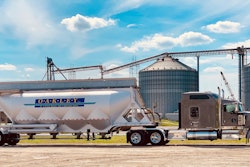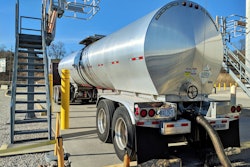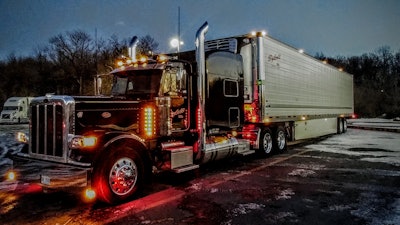 A reefer trailer is the best way to ensure freeze protection. Zac McGlothlen uploaded to Overdrive’s Reader Rigs gallery this photo of his 2015 Peterbilt 389 pulling a 2013 Vanguard reefer.
A reefer trailer is the best way to ensure freeze protection. Zac McGlothlen uploaded to Overdrive’s Reader Rigs gallery this photo of his 2015 Peterbilt 389 pulling a 2013 Vanguard reefer.Keeping produce and livestock safe while transporting in the heat is common enough, but there is also demand for protecting certain other freight when the mercury heads in the opposite direction.
Liquids, certain chemicals and solids such as cosmetics are among cold-sensitive freight. Some will combust or explode if they get too cold, says Hilary Gerlach, senior business development lead for broker Zipline Logistics.
“It could also mean smaller consequences like the ingredients separating or the overall quality of the product not being the same,” Gerlach says. “Aluminum cans will explode, and plastic bottles can burst. It’s any product that doesn’t have the same quality if it freezes.”
She says many summertime reefer customers for Zipline, which specializes in food and beverages, also need protection in wintertime because grocers want the products delivered at the same temperature year-round.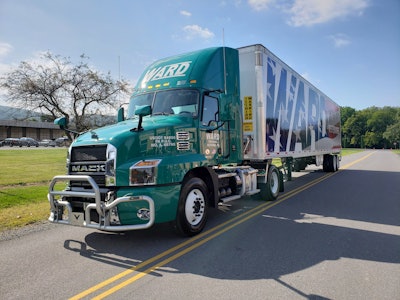
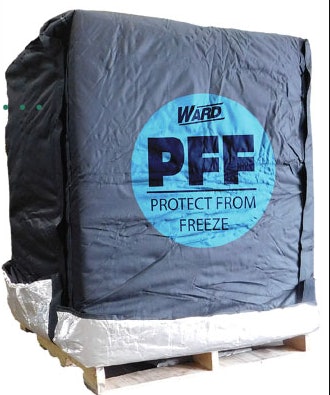 Ward Trucking offers freeze protection services without using reefer trailers, instead using SureTemp pallet covers for next-day and two-day LTL shipments.
Ward Trucking offers freeze protection services without using reefer trailers, instead using SureTemp pallet covers for next-day and two-day LTL shipments.For some fleets, freeze protection is a minor factor in a broad array of freight. Ward Trucking, a 600-truck fleet based in Altoona, Pennsylvania, handles only less-than-truckload shipments, with most protect-from-freeze (PFF) orders being just a pallet or two, says Mike Moss, chief operating officer. However, there are also plenty of full-truckload freeze-protect shipments that may be more enticing for owner-operators looking to offer that specialty. Alexandra Smith, a national account manager for broker PLS Logistics, says her department handles only full-truckload shipments. About three-quarters of the PLS wintertime business requires freeze protection.
“We mainly see protect-from-freeze requests with liquids, but we also see it with paint, cleaning products, batteries, electronics, pharmaceuticals,” says Trent Opferman, also a national account manager for PLS. “Almost everything shipped in the northern and central U.S. requires freeze protection.”
Gerlach says growing consumer demand for fresh grocery products is stoking freeze protection services.
“I don’t think the population will move away from ‘better-for-you’ choices,” she says. “This means we’ll see demand for temperature-controlled solutions rise.”
Using a reefer is the best way to nearly guarantee freeze protection. In addition to having insulated trailer walls, the refrigeration units can be set to warm a trailer in extremely low temperatures.
The only problem is if the unit breaks down, and investing in a reefer trailer might not be worth it unless you plan to fully switch to reefer year-round. However, there is a low-tech option: insulating quilts or blankets. Pallet covers are adjustable, using Velcro to fit snugly around the load, and there are also blankets that can cover large areas.
Moss says Ward Trucking, operating regionally in the Northeast and Midwest, uses pallet covers. The fleet’s company drivers average 250 to 280 miles per load and operate mostly in a next-day environment, so freight doesn’t sit on trailers for long.
“I’d contend that even without the blanket, if you keep it moving in a next-day environment, you’re pretty safe,” Moss says. “But we still apply the cargo quilts to all of our PFF shipments.”
Moss says Ward’s line-haul department monitors shipments to watch for environments that could cause the load to freeze. When necessary, they’ll work with the driver to take an emergency measure, such as putting the freight into a heated warehouse.
Zipline’s Gerlach says truckload-sized blankets are available that cover the entire floor and walls of a 53-foot van. Most times, she says, it’s shippers who buy and use these large blankets.
“A partner we work with will send a team to a manufacturer or shipper facility to teach the dock worker how to put the blankets in the trailer and load the product so the blankets will work,” Gerlach says. “Then they’ll go to receivers to teach them how to fold the blankets properly. We’ve had companies ship 10 orders of full truckload with blankets, then after the 10th load, the receiver puts the blankets on a pallet and ships them back to the shipper.”
None of her customers have filed claims against Zipline because a product insulated with blankets got too hot or too cold.
“As long as you’re working with shippers willing to use blankets, dry vans can haul protect-from-freeze freight,” she says.
When hauling freeze-protect freight, even with a reefer, keep an eye on the weather. When temperatures dip below zero, it can be difficult to guard against the environment, and trucks are more prone to break down from fuel gelling or other issues.
PLS’ Smith says many shippers don’t want to risk their products in such situations and generally are understanding if carriers need to wait out a cold snap.
How much extra money can you make?
If you move a high volume of freeze-protect freight, you can expect to see a noticeable difference in your bottom line. Mike Moss says Ward Trucking typically adds a charge of $1.50 per 100 pounds with a $20 minimum and a $75 maximum. Alexandra Smith of PLS Logistics says freeze-protect loads often see $50 to $100 added to the rate. For transport using blankets instead of a reefer, the fees are smaller.
Owner-operators looking to haul freeze-protect freight should build relationships with shippers or brokers and make it known to them that you can provide freeze protection, whether it’s by using a reefer, pallet covers or blankets. If you use load boards to secure freight, add freeze protection to your profile, noting what equipment you have, says PLS’ Trent Opferman.


